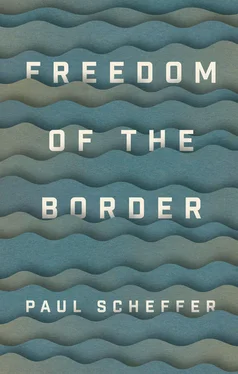More fundamentally, his cosmopolitanism was always restricted to the Christian world. His aversion to nationalism was inspired by disappointment that Christians were in conflict with each other. In his Adages he writes,
We are continually at war, race against race, kingdom against kingdom, city against city, prince against prince, people against people, and (the heathen themselves admit this to be wicked) relation against relation, brother against brother, son against father; finally, a thing which in my opinion is worse than these, Christians fight against men; reluctantly I must add, and this is the very worst of all, Christians fight Christians. 9
Rarely has anyone written so passionately in opposition to war. Erasmus goes to great lengths to convince those in power that war brings out the worst in people and that it has absolutely nothing to do with heroism. He writes with disgust about what he sees as trifling reasons for taking up arms. The terrible consequences are clear in his mind. Nevertheless, in this matter too he directs his appeal to the Christian princes and to the leaders of the Church in his day, and his pacifism is more limited than it seems at first sight.
In 1523 he writes to Francis I, king of France,
I pray, therefore, Jesus, the immortal King of the whole world … that he would impart his Spirit … to all Kings, that they may live in unity, and consequently in happiness, one with another, … and to all people, that under monarchs at once pious, holy, and prosperous, they may enjoy peace; that by these means, and not by invading and laying waste the territories of others, which only makes them poorer and not better, evangelical piety, once firmly established, may be diffused far and wide; that evangelical philosophy may be every where preached with sincerity of heart by men endowed with the true evangelical spirit. 10
Here two motives are intertwined: the desire for the conversion of all who now find themselves outside Christendom and the idea that it is precisely by setting a good example that the enemies of Christendom will be driven back.
Then would Christians be formidable to their enemies, against whom we can now scarcely defend our own territories, so far are we from driving them to a greater distance; though, for my own part, I could rather wish that they were converted from the error of their ways, than that they should be exterminated. But how shall we convert them from the error of their ways, when we ourselves are, I had almost said, more depraved than they? 11
Here Erasmus touches upon one of the great issues of his time, the relationship of Europe to the Ottoman Empire, or what was known as the War against the Turk. Here too a pacifism comes to the fore that is intended to convince by setting a good example. ‘Will ye bring the Turks to the faith of Christ? Let us not make a show of our gay riches, nor of our great number of soldiers, nor of our great strength. Let them see in us none of these solemn titles, but the assured tokens of Christian men.’ 12At the same time he is not wholeheartedly opposed to the war. In a letter of March 1530 he observes, ‘Someone will perhaps deduce from all this that I have undertaken the task of arguing against a Turkish war. Not at all; on the contrary, my purpose is to ensure that we make war against them successfully and win truly splendid victories for Christ.’ 13
The questions raised by Erasmus’ cosmopolitanism and pacifism are still significant today, and the limitations and contradictions of the ideal that he propagated are of assistance to us. His quest is our quest. What is the relationship between power and morality in Europe? Is it enough to be a soft power that tries to set a good example, or do we also need the hard power of weaponry as a deterrent?
Another question that arises from reading Erasmus remains relevant. Should we base the idea of Europe on a ‘clash of civilizations’ – the battle of Christianity against other religions – or should we stick to a secular point of departure, outside the bounds of any presumed Judaeo-Christian heritage? There can be no doubt that Europe was shaped by Christian humanism, but a carefully considered cosmopolitanism attempts to reach beyond the heritage that for Erasmus inevitably defined the horizon of life.
The modern notion of the citizen of the world comes to fruition only with the eighteenth-century Enlightenment. In his essay Perpetual Peace , the most important philosopher of the Enlightenment, Immanuel Kant, advocates cosmopolitanism and pacifism. He does not believe in world government – in which he sees the danger of despotism – but he does embrace world citizenship, saying that it has been made possible by increased communication: we know more and more about each other, and all of us, all over the world, simultaneously feel the sufferings of one specific place. We can no longer ignore human need beyond our borders. Humanity is not on its way to political unification but to moral unification, according to a philosopher who never left his home town of Königsberg.
The essence of Kant’s view is that we must base our striving for eternal peace on a realistic vision of humanity and of the world. We are not engaging in philanthropy here, he writes tartly. The first of what he calls his ‘definitive articles for perpetual peace’ runs ‘The civil constitution of each state shall be republican.’ 14He is referring to a separation of powers, equality before the law and the principle of representation. His hope is that such a constitution will cause the interests of citizens to prevail.
In an essay on international politics, therefore, Kant gives primacy to domestic matters of state. Although he was not thinking of liberal democracy as we know it today, from his approach has grown the doctrine of ‘democratic peace’, which states that there are few examples of countries with a democratic political system that have gone to war with each other. This does not mean they are any less willing to use violence, since they have often fought with rivals that were, or were deemed to be, dictatorships.
Kant’s next ‘definitive article’ reads ‘The law of nations shall be founded on a federation of free states.’ 15In other words he opposes the idea that lasting peace requires a world government. A difference remains between the coercive laws that regulate life within states and the voluntary settlements of conflict between states laid down in peace treaties. The big question here is whether lasting peace can be achieved without coercive legislation and the sanctions that go with it. Kant insists upon the sovereignty of states as his starting point. All he expects from a hierarchical system of international government is a new form of tyranny.
His final ‘definitive article’ is as follows. ‘The rights of men, as citizens of the world, shall be limited to the conditions of universal hospitality.’ 16His intention here is to make clear that states must be open to foreigners – hospitable, therefore – but need not be obliged to give everyone the right to settle in them freely. This is an important distinction, and one that is often overlooked by those who advocate open borders and look to Kant’s work for support.
‘Eternal peace’ between states does not depend on the moral improvement of people, Kant believes. He wishes to base his proposals for peace on the self-interest of citizens, who are the first to experience the consequences of war. Kant points out that international trade creates so many common interests that there is less and less to be gained by war. At the same time he does not hold such pragmatic motives in particularly high regard, as we see from a passage in which he expresses appreciation for the noble way of thinking of a people that exposes itself to danger: ‘On the other hand, a long peace generally brings about a predominant commercial spirit, and along with it, low selfishness, cowardice, and effeminacy, and debases the disposition of the people.’ 17
Читать дальше












